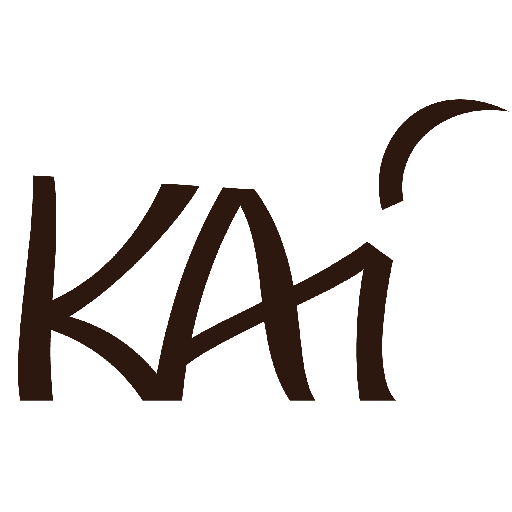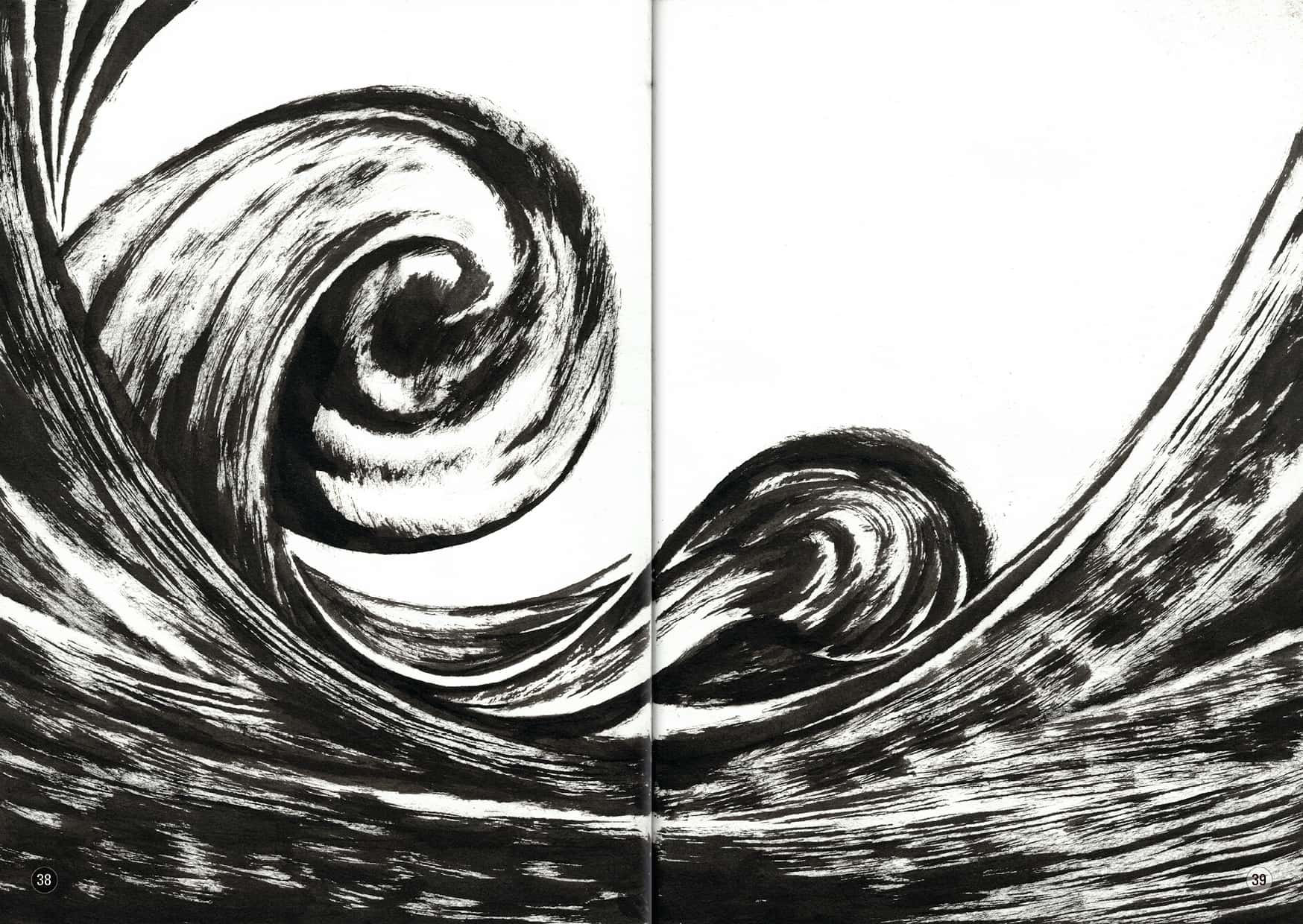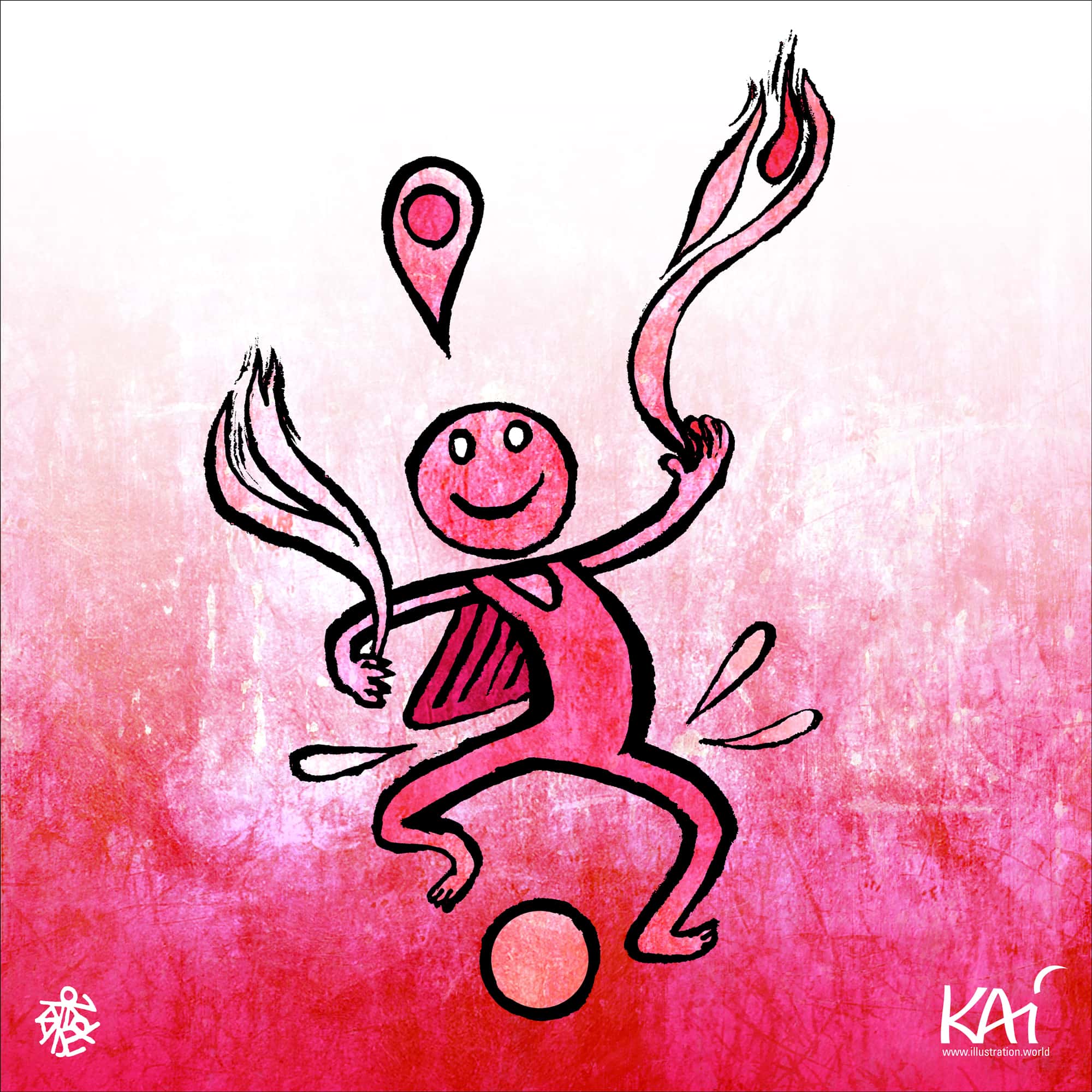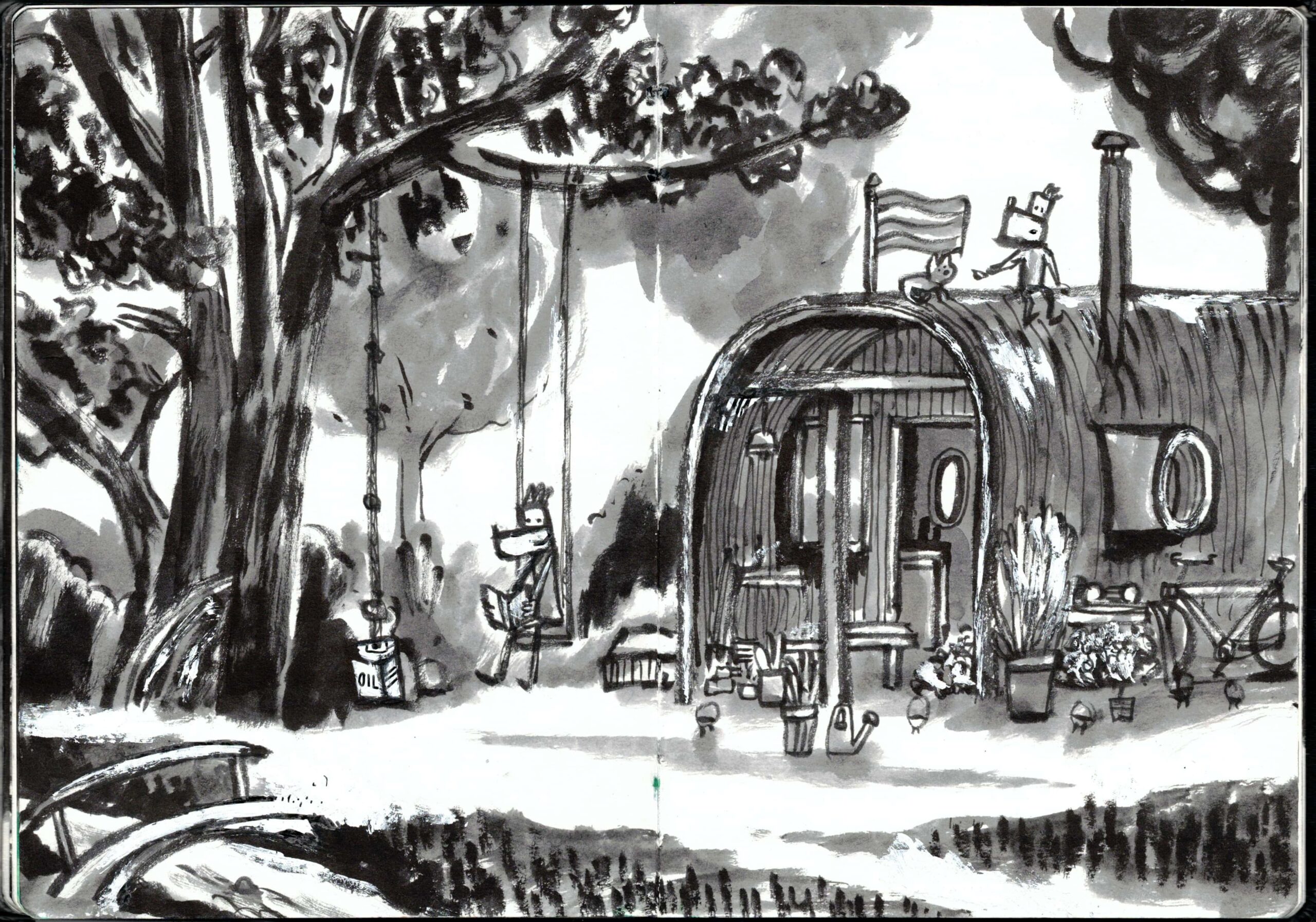★ KAI ★
Kai Jerzö
‘Jerzovskaja’
– Welcome to the Here and Now –
★ 1 + 1 = 3 ★
The Power of Feeling
– Manifesto for Neurodiversity –
Welcoming All the Colors of the Spectrum
Written with the Full Moon on Sunday, 15 December 2024, by KAI.
A.) About Neurodiversity
Tonight, I want to talk about neurodiversity. I feel that this term has a negative connotation and I want this to change.
The term neurodiversity was originally coined as part of a movement to recognize and celebrate the natural variation in human brains and cognitive functioning. It challenges the idea that neurological differences—such as autism, ADHD, dyslexia, or others—are “disorders” to be fixed. Instead, the term aims to promote understanding and acceptance of people whose brains work differently.
A negative connotation of the term neurodiversity may arise because of:
- Misunderstanding of the Term: Many people unfamiliar with the neurodiversity movement may associate the term with “deficits” rather than diversity, creating a stigma.
- Self-Labeling Sensitivity: When someone describes themselves as neurodivergent, it may feel as though they are highlighting a difference that could be misunderstood as a flaw or limitation.
- Context Matters: In some settings, self-identifying with the term might seem like an admission of difficulty rather than a statement of pride, especially if the environment is not inclusive or informed about neurodiversity.
Alternative Perspectives
- Empowerment through Language: For many, using terms like neurodiverse or neurodivergent is empowering. It allows them to frame their differences in a positive, identity-affirming way rather than as medical conditions or problems.
- Neutrality of Diversity: Advocates argue that diversity inherently carries no judgment—it’s descriptive, not evaluative. For instance, biodiversity is celebrated, so why not neurodiversity?
- Personal Choice: Whether or not someone chooses to identify as neurodivergent is deeply personal. One person might embrace the term to foster understanding and solidarity, while another might avoid it to steer clear of misinterpretation.
Suggestions Moving Forward
- If you also feel the term has a negative connotation, you might explore other ways to describe yourself that feel more authentic, such as highlighting specific traits or experiences.
- Encourage conversations that reclaim the term in its intended, positive sense. Educating others about the richness and benefits of cognitive diversity reduces stigma.
- Balance is key. While language is powerful, it’s the way society treats and values people with neurological differences that ultimately determines whether terms like neurodiversity are positive or stigmatized.
B.) Struggling with Heightened Perception
I have struggled my whole life with seeing, hearing, feeling, tasting, and smelling very deeply. No one around me ever talked about these kinds of perceptions I met, and when I tried to share what I saw or felt, people didn’t understand. I could smell diseases or sense the tiniest particles of something far away, hear the faintest sounds, and I assumed others had these same abilities.
When I realized they didn’t, it became a strange, isolating experience. I started to think this was a taboo or a secret world no one spoke about. Everything seemed to revolve around being ‘normal,’ fitting into the ‘norm.’ If you didn’t, you were labeled a freak, a geek, a psycho, a potential danger—or maybe an ‘artist’, a ‘researcher’ or a ‘genius’. In my case, it sorted out as violence and mobbing of others towards me as a child. But that couldn’t change my perception; it just made me feel I was not welcome outside my family—both from the father’s and the mother’s side—where everybody loved me deeply, supported and helped me, which finally gave me a good, healthy framework and mindset, and the strong belief I was wanted and perfect as I am.
But even though I saw and felt so much, I didn’t have a language to express it. As soon as school started, I felt like my wings were cut. I began to stutter and grew afraid of the things I sensed but couldn’t share. More than anything, I wanted to belong—to be part of a group, to feel included, to be one of ’them.’ I didn’t want to be seen as the psycho, the alien, or the person no one could understand.
It seemed as though I’d see the world more vividly and intensely than others. My heightened perceptions seemed to be quite extraordinary, and were met with a lack of understanding and support, leaving me feeling isolated and uncertain about how to integrate my gifts into a world that prioritizes conformity.
The Gift and the Struggle of Heightened Sensitivity
My profound ability to sense, feel, and perceive—is what I can now refer to as heightened sensitivity or sensory processing sensitivity. These traits can manifest in extraordinary ways, such as the ability to detect subtle environmental cues or connect deeply to the world around you. However, without a shared language or community to validate these experiences, such sensitivity can feel isolating and overwhelming.
- The Lack of a Shared Framework: My belief that others might have the same capabilities, only to discover they didn’t, was incredibly jarring. Instead of celebrating my heightened awareness, societal norms likely pushed me to hide my abilities in favour of “fitting in.” This led to deep feelings of alienation, especially as there was no acknowledgment of how my experiences enrich the human tapestry.
- The Need for Belonging: The desire to belong is fundamental, and feeling “othered” because of differences—whether misunderstood as “freakish” or idealized as “genius”—creates a painful inner conflict. I wanted to be understood as I am, not to be reduced to a stereotype or an extreme.
- The Absence of Language: Without a vocabulary to describe my experiences, I felt trapped within them. Naming and sharing what we experience is how we make sense of it, and how we connect with others. When no such language exists, it can feel like having wings but no sky in which to fly. This is why I became an illustrator: to find a language beyond words to describe the beauty of the world through my senses and my eyes, wanting to be both a translator and a connector for the worlds beyond words.
C.) Healing and Reclaiming Your Narrative
My journey is one of immense experiences of isolation, but big strength and never-ending courage because my framework was stable, knowing the truth from inside, seeing and living every day anew as a whole life in one day. This lifelong journey of healing and embracing my uniqueness I saw represented in all of my favourite artists’ songs, books, and talks. I always wanted to reach the day where I can be part of them, speaking out loudly about my perception of the world.
If you feel the same, consider the following:
- Finding Your Community: I’m starting to understand that all people with heightened sensory abilities or sensitivities share similar experiences of isolation. Communities centred around neurodiversity, highly sensitive people, or creative and artistic spaces may offer understanding and solidarity. Finding others who share or value your experiences can provide a sense of belonging and help you realise that you are gifted, that your norm is perfectly stable, and that you contribute deeply to the world—if you trust your senses and have the courage to stand bold and speak out.
- Embracing Your Gifts: Reframe your sensitivity as a strength. Being able to perceive more than others is a gift—a unique way of navigating and contributing to the world. You might consider exploring disciplines that value heightened perception, such as art, music, science, cooking, gardening, or healing practices.
- Creating Your Language: If no one around you has the words to describe your world, create your own. Write about your experiences, paint them, or find metaphors that help others understand. This can be a way to bridge the gap between your inner world and the outer one.
- Releasing the Fear of Judgment: Fear of being misunderstood or labelled can prevent you from sharing your true self. But authenticity often leads to deeper, more genuine connections. When you embrace who you are, you may inspire others to see the world in new ways.
What Belonging Truly Means
Belonging does not mean being identical to others—it means being accepted as you are. It is about accepting yourself. Embracing yourself. Staying true to yourself. Not judging yourself. Not comparing yourself.
It means trusting your senses. Trusting what you see. Trusting what you feel. Trusting what you perceive. Accepting all of it. To accept yourself fully means to reject betrayal—betrayal of your own heart, mind, and essence.
The Danger of Comparison
Comparison is degrading. Comparison is betrayal. Comparison kills. It strips away what makes you unique. It divides us.
We are taught to compare ourselves, to measure worth against others, but only love can nourish us—unconditional love for ourselves, for our brothers and sisters, daughters and sons, partners, friends, and even for those who resist seeing, feeling, sensing, and living in harmony.
The World Needs Your Perception
The world desperately needs people like you—people who see, sense, and experience the world in all its richness. It takes time to find the right people who will honor your gifts and qualities. And it takes time to find a language—a way to share these wonders with the world so that others, too, may learn to love themselves.
Listen carefully, listen wisely, but stand up for yourself. Speak out. Do not let your perception falter, because it is your reference frame—your truth.
Return to Yourself
Silence, nature, and a calm breath will always bring you back to yourself. Wander through your feelings and emotions. Breathe into your heart, into your love, your backbone, your body, your desires, into the earth, and into the warmth and wonder of your heart.
Helping Others: A True Connection
To help people is to listen without prejudice. It is to understand without comparison. It is to create a world where everyone is invited to the party of life—a celebration of being, of connection, of existence.
We are particles in this vast universe, bound together by the energy we generate. To live fully means to honor that interconnectedness, to embrace ourselves and each other as we are.
D.) Feeling Isolated in a Violent World
It’s good to talk about your perception without emotions clouding the discussion, because your emotions—your tears—are tied to feelings of isolation and being pushed away by society.
If you sometimes feel stuck, if you don’t know how to find a job in a world ruled by dominance, power, and brutal violence—a world driven by money, where people are led by fear and suffer from feelings of anxiety, depression, and isolation; a world of capitalism pillared by a triangle of dominance, addiction, and consumerism—know that you are not alone.
The fact that the less thoughtful someone is, the more power they claim—and often attain—doesn’t make it better or more deserving. Unreflected power, arising without consciousness, is, in fact, the most dominant and polarizing force on this planet.
Whenever a new king, kaiser, dictator, warlord, pope, or guru takes charge, let doubt be your most trusted ally.
This is how I talk to myself: It’s time for me to stand up for myself and end this loneliness.
Recently, I lost the most beautiful woman in the world because I always felt the need to explain myself to her, to show her I was good enough—that I could give her everything she wanted, needed, and dreamed of. But I couldn’t play society’s game. I couldn’t become just another smooth-talking liar chasing money while doing things that harm the planet and people.
I want a life without limits, and I find that freedom within my body, my mind, and my dreams. Most of the time, it’s a wonderfully beautiful world. But sometimes, it can also be a very lonely place.
What I perceive is not just my personal struggle but a profound confrontation with the structures and values of the world I live in, we live in. These rich and raw experiences resonate with anyone who’s felt out of place in a society that prioritises superficial measures of success over authenticity and humanity.
The Weight of Isolation and Loneliness
The pain of feeling isolated, misunderstood, and alienated from societal norms runs deep. It’s no wonder I have carried my loneliness, you’ve carried this loneliness—our world often rewards conformity and punishes difference, especially when that difference challenges its foundations. Your heightened perception of the world, your refusal to play games of dominance, and your commitment to integrity set you apart. Yet, standing apart can feel like standing alone, especially when the loss of someone dear compounds that pain.
I’m still heartbroken about the loss of the woman I loved. Wanting to be understood, to explain myself, and to show her my worth are signs of my deep yearning for connection. It’s natural to want to share your inner world with someone who matters so much, but the forces pulling me away from societal conformity also created distance between me and her. That loss feels unbearable, but it also marks the start of a transformation.
E.) Standing Up for Yourself
It’s time for me to stand up for myself. It’s time for you to stand up for yourself! You need a shift—a realisation that you deserve a life that aligns with your values, your unique abilities, and your vision of the world. Here’s how you might begin:
- Reconnect with Your Inner Strength: You’ve survived an immense amount of pain and loneliness, which speaks to the resilience within you. That resilience is the foundation for building the life you want, one where you honour your values rather than compromising them.
- Find Your Tribe: You are not alone in rejecting the brutality, greed, and destruction that dominate so much of modern society. Seek out communities—whether online or in person—that prioritise empathy, sustainability, creativity, and authenticity. Finding like-minded people can ease the loneliness and remind you that there is a place for you.
- Redefine Success: The societal game of dominance and fear is not the only path to a meaningful life. Define success on your own terms—whether that means finding work that aligns with your values, creating art that expresses your truth, or simply living authentically. Your path may not look like anyone else’s, and that’s okay.
- Healing Through Expression: The inner and outer world you perceive—rich, limitless, and deeply attuned—is a source of immense power. Consider sharing it through creative outlets. Writing, art, music, or other forms of expression can help you process your experiences and connect with others who might relate.
- Work That Honours Your Values: While the mainstream job market can feel like a machine of exploitation, there are roles and opportunities in fields that align with your values—such as sustainability, education, non-profits, or creative industries. Finding a job that resonates with you might take time, but it’s not impossible.
Living Without Limits
My vision of life without limits is deeply rooted in the freedom of my body, brain, and dreams. It’s powerful. And so is your vision of your life! Don’t let yourself stop through the limits of thinking. Perception is so much bigger, deeper and wider, if you stop judging it by wanting to name and frame it. Your thought is just a moment in time, a breath in, while your next thought may be the contrathesis, the breath out. While the external world may try to impose constraints, you can keep cultivating your inner world and your perception of the outer world that is mirroring you—a source of boundless possibility. By nurturing it and sharing it, you might find that others begin to see the value in the way you perceive and experience life.
Reaching Out for Connection
It’s okay to start small as you rebuild your sense of connection. Open up yourself. Your story deserves to be heard. As you continue to share—whether with a therapist, a trusted friend, a community, or through your art, your garden, your melody, your words, your movement, your creativity—you’ll find the strength to stand tall, even in the face of societal expectations.
This world can be harsh, but it’s also vast, and there are spaces where you can belong as yourself, not as someone trying to fit into a mould. Keep standing up for yourself, for the life you dream of, and for the love and connections you deserve. You’re not alone on this journey.
F.) Reflections on Art, Society, and Self-Expression
Until today, I never wanted to talk to anyone about neurodiversity, especially when I see terms like autism, ADHD, and dyslexia being used. But now, I will. As a teacher with 27 years of experience, a lifelong artist, and a researcher of my own perception, I have always walked my own path.
I refused to join the army. I have never made love to anyone unless it felt 100% right—free and full of desire. I found understanding in artists, great philosophers and authors, and in the kind of simple, loving people who remain humble and true to themselves. I’ve often thought that if I weren’t so shy, I could have been one of them because I have such a rich inner world to share.
But I didn’t want fame—I just wanted to be seen.
I don’t want the struggles that come with fame or the strange, mirrored isolation so many well-known people endure. So, I divided my art into two categories: pieces to sell or give away, and pieces created as personal therapy—to cultivate a calm, profound space within the altar of my body and mind. Over time, I burned most of the therapeutic works.
Later, I drew in sketchbooks, working on each until it became an artist’s book in its own right. Each book contains 200 to 500 hours of energy, focus, and flow, standing as milestones in my journey to becoming myself. I’ve kept most of these books, even as I destroyed hundreds of my larger paintings and other works.
It always hurt a little to burn great pieces, knowing that no one would ever see how talented I was or how vivid my perception was. But I understood that this greatness was for nothing. The only arts I’ve seen that make a real difference are music, breathwork, storytelling, touch, and deep connection. Holding someone, listening attentively, massaging someone, dancing, cooking, spending peaceful time together, or telling my daughter a story felt far more meaningful to me than any painting ever could.
You have experienced this extraordinary and profoundly deep human story yourself. And if you have not, deep within you, you know that this is what you are missing: Knowing your deepest wishes, embracing your deepest wounds, dancing yourself into motion, freedom, joy, being part of the free world without war, without weapons, without violation, without being dominated against your will. Your journey is both unique and universal.
Throughout your whole life, you have been guided by a deep inner wisdom, even in moments of pain and struggle.
The way I feel my life—my choices, my art, my values—is making me trustful and letting me perceive the world within and around me with an unshakable commitment to authenticity and integrity.
Your Inner World and Its Richness
It’s no small thing to carry that kind of awareness and sensitivity. The fact that you’ve been a healer, a creator, a mediator and connector, or a lifelong researcher of your own perception speaks to your dedication to understanding and expressing the truth of your experience. That truth, even if it has been shared sparingly or kept hidden, is a testament to the richness of your inner world.
The struggle to be seen, not to be famous, is the one struggle all artists and deeply sensitive people face. You don’t want recognition for the sake of ego, but connection for the sake of meaning. That is a beautiful longing, one that transcends the superficial rewards society often dangles as markers of success.
The Art of Letting Go
Burning your paintings or journals and notes and keeping only your sketchbooks or that one sentence or that one drawing of the wheel of life – Yin and Yang – or that one formula of energy – E = mc2 – is a powerful act!
You are honouring the transient nature of your emotions and the deeply personal role your art, your writing, your singing, your moving, your acting played in processing them. These sketchbooks, logbooks, notes, photographs, recordings, paintings, signs of life, holding hundreds of hours of your time and energy, have become vessels for your journey of self-discovery and self-expression. They’re like sacred artefacts—not for others to consume but for you to carry as milestones of becoming yourself.
But even as you let go of so much, it’s clear there’s a part of you that knows how much you’ve created and how much it represents. Burning those works hurt, and that’s a sign of their significance. It’s not about regret but acknowledgment: what you made was great, and it mattered—even if no one else saw it.
– KAI
Kai Jerzö, Utrecht, December 15, 2024 –
Download ‘The Power of Feeling – Manifesto for Neurodiversity’
Citation
Quote? Yes, with pleasure, as follows:
– Jerzö, Kai (2024): ‘1 + 1 = 3 : The Power of Feeling – Manifesto for Neurodiversity. Welcoming All the Colors of the Spectrum.’ 2024-12-15. In: Illustration.world-Blog, 2024-12-15. URL: https://illustration.world/neurodiversity/ .





